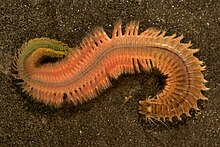Alitta succinea, also known as the pile worm or clam worm, is a common polychaete worm.
| Alitta | |
|---|---|

| |
| Scientific classification | |
| Kingdom: | |
| Phylum: | |
| Class: | |
| Order: | |
| Family: | |
| Genus: | Alitta
|
| Binomial name | |
| Alitta succinea | |
It is a species of ragworm or sandworm. The terms can refer to any one of a number of other species.
This worm can reach up to 15 centimeters (6 inches) in length. Most specimens are smaller than this. It is brown coloured at the rear, and reddish-brown on the rest of its body. It has a head with four eyes, two sensory feelers or palps, and eight tentacles. It is a freeswimming polychaete, scavenging on the bottom of shallow marine waters.
Clam worms are an important food source for bottom-feeding fish and crustaceans. They can protect themselves by secreting a mucous substance which hardens to form a sheath around them.[1]
Planktonic larvae develop, grow into adults and eventually sink to the bottom of the water.
References
change- ↑ J. Masterson (October 1, 2008). "Neanthes succinea clam worm". Smithsonian Marine Station at Fort Pierce. Retrieved June 6, 2012.